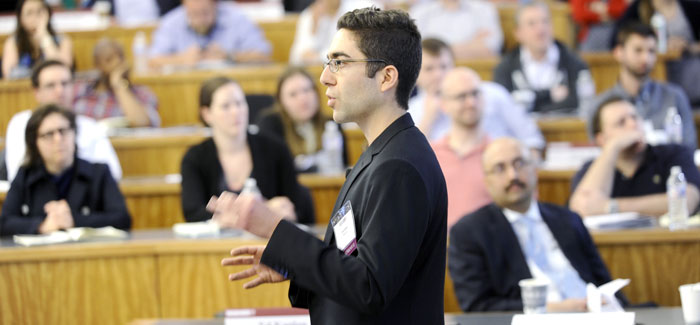
Rabie presents his business plan for Maestro during the final round of the New Venture Challenge. (Photo courtesy Chicago Booth)
The future is going to taste great
A UChicago start-up aims to become the “Keurig for delicious food.”
When you imagine “future food,” what do you think of? Maybe it’s something like a sleek, countertop device that scans food pods and cooks healthy meals that taste like home cooking (if you’re good at home cooking) at the push of the button. And then it’d also produce zero mess, and maybe it’d be a robot named Maestro.
Well, the future is now. David Rabie, MBA’15, is making it happen. The CEO of a new company, Maestro, Rabie is launching a product that he says will bring convenient, healthy home cooking to the masses. Think of it as the “Keurig for delicious food,” as Rabie describes it, but the pods the food comes in are recyclable and 100 percent biodegradable.
Working out of Chicago’s Merchandise Mart, the Maestro team—which includes Rabie, four of his Chicago Booth classmates, and an undergraduate intern—are winners of UChicago’s 2015 New Venture Challenge, a program that helps student-entrepreneurs launch new companies. In addition to the $50,000 investment from the New Venture Challenge, Rabie’s team got $20,000 from the Pritzker Venture Capital Group and entry into the Pritzkers’ Fellows Program, intended to help promising new technology companies scale up their businesses.
Rabie describes the idea that won his team the start-up funds. “I’m passionate about the bigger cause of making people healthier,” he says, while eating a Tupperware container full of what appears to be homemade oatmeal. A self-proclaimed health nut, he sees Maestro and other services like it as important parts of the process toward healthier living: “Everything is becoming increasingly connected, to the point where we’re going to be able to track everything we eat, get whatever we want at the touch of a button, and it’s all going to be fully integrated. And Maestro is making that happen in the kitchen.”
That integration consists of “removing all of the pain points” in food preparation. Rabie wants customers to have home-cooked meals, but without having to shop for, measure, and assemble the ingredients themselves; without having to cook those ingredients; and without any cleanup besides throwing away the pod.
How will this work logistically? First, Peapod, the grocery delivery service, will prepare the meals at its facility in Lake Zurich. Then customers will order food pods either through Peapod or Maestro. The food in those pods is delivered to the customer’s doorstep completely raw. To cook the pods, customers put them in the machine, close the lid, walk away, and come back to a fully cooked meal 10 to 30 minutes later. These quick meals won’t exactly be simple, either—in 10 to 30 minutes, customers will come back to steaming plates of roasted barbecue chicken, tri-colored quinoa, and roasted brussels sprouts with parmesan cheese.
As for the technology inside the machine, Rabie says it’s basically an integration of preexisting technology. The machine, which has a computer built in, scans the food pods using QR code technology, the same square barcodes that ticket-scanners use. After it’s scanned the code, the machine knows what needs to be done—what temperature to heat the chamber up to, if there needs to be a change in temperature during the cooking process (like for grains), how much water needs to go into the chamber, and how long it will take to cook the whole meal.
The Maestro team hopes to have the bulk of its fundraising done by the end of August, at which point they’ll move into nine months of product development. After the machine exists in its more-or-less final form, Maestro will do a pilot run of about 500 customers through a local Kickstarter campaign, sending the product to donors along with food pods from Peapod. Then they’ll scale up from there.
The pilot run will be important for Maestro because it will show people that the food actually tastes good—it actually tastes like a home-cooked meal. Through Peapod, Maestro initially aims to have five to 10 options available at a time, but plans to rotate those options frequently, and to cater to people’s dietary restrictions and food preferences. Thai chicken curry with truffle salt quinoa and roasted broccoli and red peppers, for example, will be one of these rotating options. Eventually, Maestro aims to establish partnerships with more restaurants, grocery stores, brands—any company that makes food that ends up in a supermarket could realistically make food pods for Maestro.
Though there’s still a long way to go before Maestro is a household name and household appliance, Rabie and his team have come a long way in a pretty short time. And soon, in Maestro’s vision, customers will be able to complete what would previously have been hours worth of steps in a very short time.
